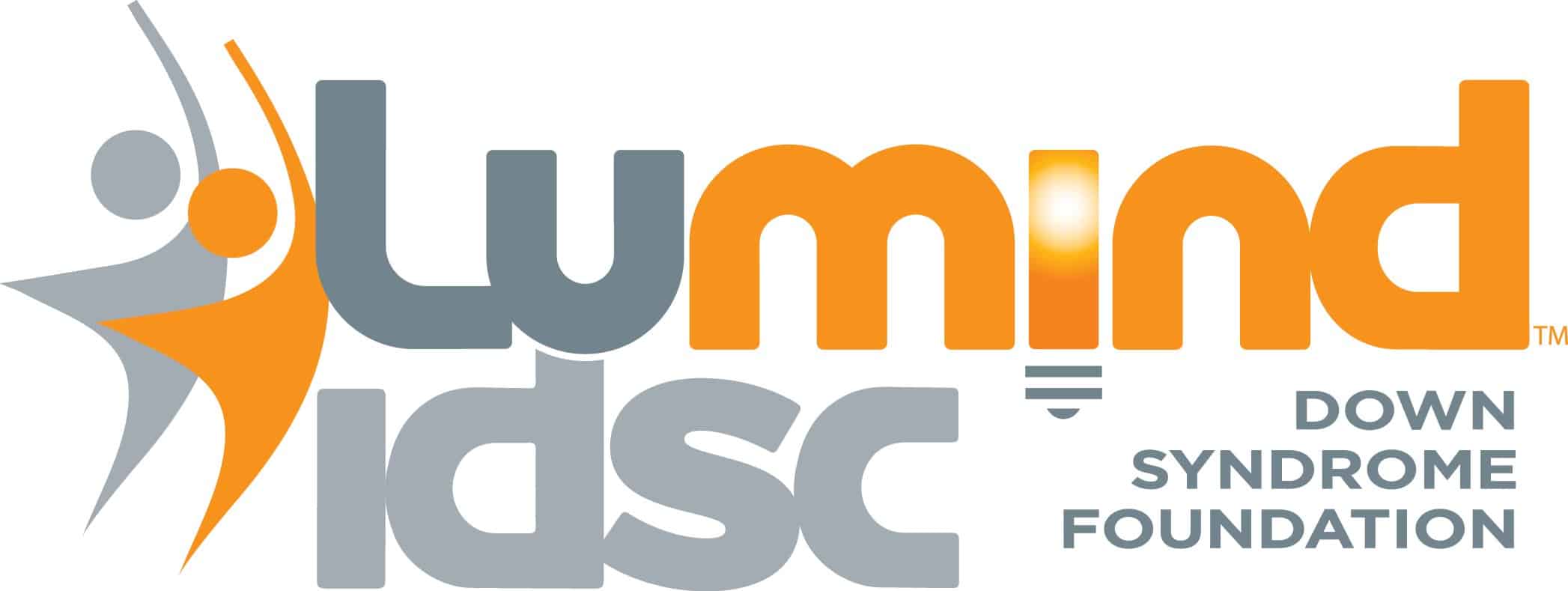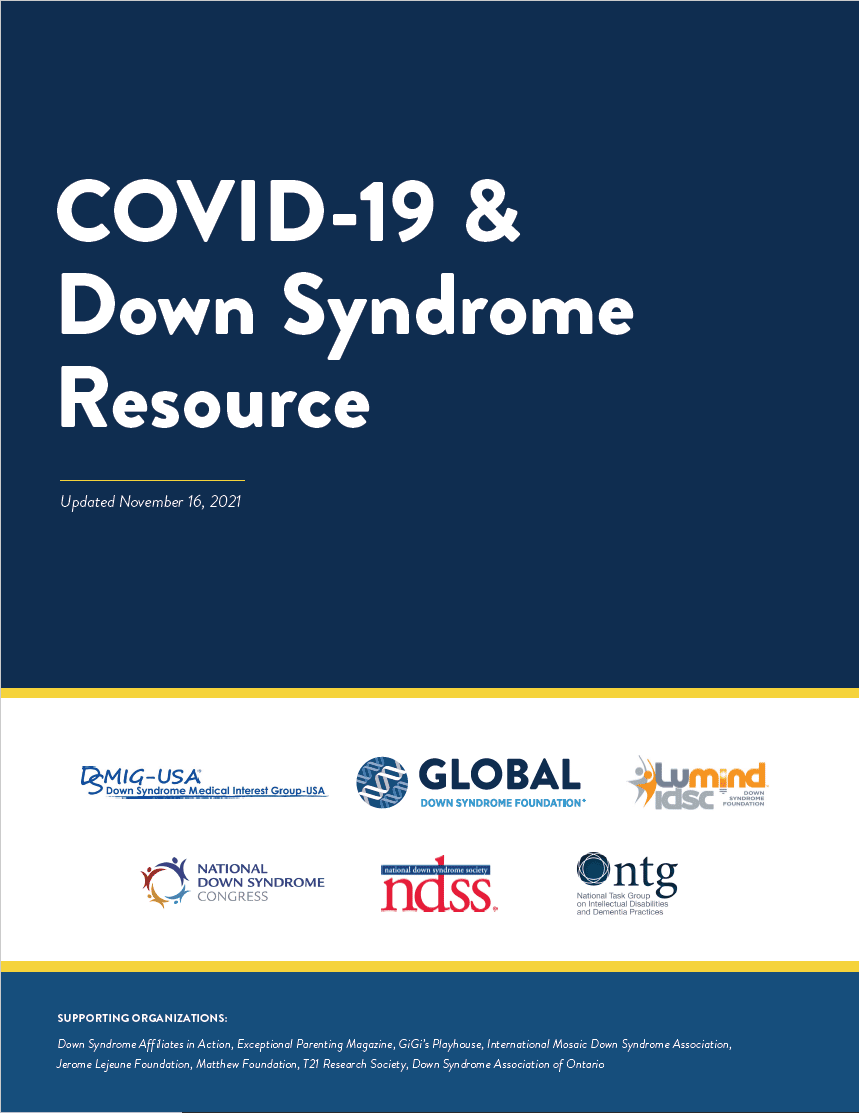LuMind IDSC and other Down syndrome organizations have received inquiries from families about COVID-19 and their concerns for their loved one with Down syndrome. The information is currently evolving and we are closely monitoring current and accurate information surrounding COVID-19.
PLACE YOUR ORDER FOR FREE AT-HOME COVID-19 TESTS
Residential households in the U.S. can order one set of 4 free at-home tests from USPS.com.
To order, click on the button below:
LUMIND IDSC'S VETTED COVID-19 PUBLICATIONS AND UPDATES
The Trisomy 21 Research Society Survey Results: COVID-19 Vaccination
COVID-19 Vaccination in People (12+ Years) With Down Syndrome: The Trisomy 21 Research Society Survey
LuMind IDSC and other organizations worked with the T21 Research Society to survey 1700 families about their COVID-19 Vaccination experience. We are very grateful to all the families who responded! Here are the survey results, which revealed: The COVID-19 vaccine is safe and effective for individuals with Down syndrome.
- Most people had either no or very mild reactions after vaccination
- Fewer than 1% of the vaccinated individuals with Down syndrome contracted COVID-19 after vaccination
- All individuals with Down syndrome who had COVID-19 after vaccination fully recovered
Intellectual and Developmental Disability COVID-19 Vaccination Position Statement

January 6, 2022
UPDATED COVID-19 & Down Syndrome Resource DSMIG-USA and our partners have updated the Intellectual and Developmental Disability COVID-19 Vaccination Position Statement to reflect the most current local and national guidance. At this time, we recommend the COVID-19 vaccine and booster shots for all children and adults with Down syndrome or other intellectual disabilities who are eligible who do not have a specific contraindication to the vaccine. Our recommendation is consistent with national and local guidelines for receiving the COVID-19 vaccine. The full document contains additional information supporting our recommendation as well as answers to questions we have received. If individuals with Down syndrome or another intellectual disability have concerns about the vaccine, we recommend discussing their concerns with their health care provider.
For People with DS 18+ Who Have Received Their Second Dose of The Pfizer Covid-19 Vaccine
T21RS Statement Regarding COVID-19 Booster Vaccination
T21RS statement regarding COVID-19 booster vaccination for individuals with Down syndrome
December 3, 2021
Analysis of various data sources collected during the COVID-19 pandemic has established that individuals with Down syndrome are at increased risk for both hospitalisation and mortality after infection with SARS-CoV-2. Adults with Down syndrome were amongst the highest risk groups for mortality. Furthermore, there have been concerns that, when admitted to hospital during peak infection periods and when demands on resources are high, people with disabilities and long-term conditions may not be prioritised for access to scarce resources such as respiratory ventilation or intensive care beds.
It has been the clinical experience of many Down syndrome clinics in different countries that COVID-19 vaccines can be safely given to children (from age 12) and adults with Down syndrome. There are also reasonable indications that full vaccination offers significant protection against the poor outcomes associated with infection in people with Down syndrome. However, based on our understanding of the immune response in Down syndrome, including reduced numbers of and differences in memory B cell responses, and previously published studies on the immunological response of those with Down syndrome to other vaccines, their antibody response to vaccination may be less robust when compared to peers without Down syndrome.
We therefore recommend that individuals with Down syndrome should be amongst those prioritised for booster vaccination for persistent production of antibodies against COVID19 antigen. There have been some indications of additional benefit by combining vaccines from different sources (e.g. Pfizer and Moderna, or Moderna and AstraZeneca) to promote better immune responses based upon studies in the general population, but any booster is preferable to none.
Selected references/ further reading:
Susceptibility to COVID-19 in Down syndrome – https://link.springer.com/article/10.1007%2Fs12017-021-08651-5
Immune dysregulation associated with Down syndrome – https://www.frontiersin.org/articles/10.3389/fimmu.2021.621440/full
T21RS surveys of COVID-19 in Down syndrome, including side effects of vaccines – https://www.t21rs.org/results-from-covid-19-and-down-syndrome-survey/
Defective B-cell memory in patients with Down syndrome – https://www.sciencedirect.com/science/article/abs/pii/S0091674914009701
Prepared by the T21RS COVID-19 Task force
COVID-19: Recommendations for People with Down Syndrome to Safely Re-enter Into the Community
COVID-19: RECOMMENDATIONS FOR PEOPLE WITH DOWN SYNDROME TO SAFELY RE-ENTER INTO THE COMMUNITY
“As people with Down syndrome make plans to re-enter and re-engage in their communities, the Down Syndrome Program at Massachusetts General Hospital offers the following information and resources so caregivers can make informed decisions that are right for their families.”
CDC COVID-19 Materials for People with Intellectual Disabilities
COVID-19 Materials for People with Intellectual and Developmental Disabilities and Care Providers
COVID-19 & Down Syndrome Resource
May 12, 2021
Today, an important and timely COVID-19 and Down Syndrome Resource was published by a consortium of national Down syndrome organizations: the Down Syndrome Medical Interest Group-USA (DSMIG-USA), Global Down Syndrome Foundation (GLOBAL), LuMind IDSC Foundation (LuMind IDSC), National Down Syndrome Congress (NDSC), National Down Syndrome Society (NDSS), and National Task Group on Intellectual Disabilities and Dementia Practices (NTG).
The Resource builds upon the publication of the Q&A on COVID-19 & Down Syndrome and focuses on new and updated information specific to testing, vaccines, mental health, ways to stay safe, and advocacy in hospital settings and for appropriate care. It is available in both English and Spanish.
DSMIG Statement about the COVID-19 Vaccine
The Down Syndrome Medical Interest Group (DSMIG) has released this position statement about the COVID-19 vaccine. This statement addresses some common questions from families in the Down syndrome community in regard to considerations of who should or should not receive the COVID-19 vaccine. Click here to view the full document.
dsmig_covid_vaccine_position_statement_010521LuMind IDSC Joins National Consortium COVID-19/Down Syndrome Resource
LuMind IDSC joins National Consortium to Create Important COVID-19/Down Syndrome Resource
The unprecedented spread of Coronavirus (COVID-19) presents the world with a unique challenge and calls for a united response to better understand its impact on the Down syndrome community. LuMind IDSC Foundation (LuMind IDSC) is proud to collaborate with Down Syndrome Medical Interest Group-USA (DSMIG-USA), Global Down Syndrome Foundation (GLOBAL), National Down Syndrome Congress (NDSC), National Down Syndrome Society (NDSS), and National Task Group on Intellectual Disabilities and Dementia Practices (NTG) and Down syndrome medical experts to publish a new resource.
COVID-19 and Preserving Human Rights for People with Down Syndrome
COVID-19 and Preserving Human Rights for People with Down Syndrome
As medical systems plan for a possible flood of COVID-19 patients, healthcare professionals in the United States may draft guidance to ration care in order to ensure the largest number of people will survive the pandemic. However, LuMind IDSC has read reports of at least two cases from Alabama and Washington State where the guidance could limit access to needed care for people with disabilities, including those with Down syndrome, in violation of non-discrimination laws. Several organizations, led by the Arc and The Center for Public Representation, recently filed complaints with the U.S. Department of Health and Human Services Office for Civil Rights (OCR).
LuMind IDSC is coordinating with other leading Down syndrome organizations to prevent discrimination in the provision of care and treatments for people with Down syndrome.
AUDIO-VISUAL COVID-19 RESOURCES
COVID Vaccine for Younger Children and Boosters for Adults
#117 - COVID Vaccine for Younger Children and Boosters for Adults
Down Syndrome Center Podcast
November 10, 2021
Dr. Andy Nowalk joins the podcast again today to discuss the latest news in COVID as it relates to people with Down syndrome. The podcast highlights the release of the COVID vaccine for 5-11 year olds and discusses booster doses for people with Ds over 18 years old.

Podcast Episode: COVID-19 and Return to School 2021 With Dr. Andrew Nowalk
Source: Down Syndrome Center of Western Pennsylvania. Access through myDSC.
Login to myDSC:
Q&A on COVID-19 and Down Syndrome with Dr. Nicole Baumer
Q&A on COVID-19 and Down Syndrome with Dr. Nicole Baumer
Webinar: "Down Syndrome and COVID-19: What You Need to Know"
SPEAKERS: DR. BRIAN SKOTKO AND DRA. ANA CLAUDIA BRANDÃO
Moderator: Claudia Moreira
Free Access: https://www.youtube.com/watch?v=0gtwz-BLtqg
This project was produced by the Mass General Hospital Down Syndrome Program in partnership with the Alana Foundation. The goal of the webinar is to provide factual and evidence-based information for individuals in Brazil with Down syndrome and their families. It is in both English and Portuguese and the content covers updates related to the COVID-19 pandemic, the vaccine, and the impact of the pandemic on people with Down syndrome in the United States and Brazil.
WORK, TRAVEL AND OTHER RESOURCES FOR FAMILIES
List of Online Resources Helpful to Families for Education and Entertainment
Resources for Families
These unprecedented times due to the Coronavirus (COVID 19) pandemic necessitates the need to stay home and practice social distancing. With schools closures, parents working remotely, and families staying at home, we find ourselves more socially isolated. We have compiled a list of online resources that may be helpful to families as more of us turn to online resources for both education and entertainment during these challenging times.
Fraudulent Claims and Products
Resources for Families
U.S. Food & Drug Administration
The U.S. Food and Drug Administration is issuing warning letters to firms for selling fraudulent products with claims to prevent, treat, mitigate, diagnose or cure coronavirus disease 2019 (COVID-19). They are actively monitoring for any firms marketing products with fraudulent COVID-19 prevention and treatment claims. An active listing of warning letters can be found on their website.
The World Health Organization (WHO) has created a Myth Busters page on their website to distinguish fact from myth.
WHO has also refuted viral claims that holding your breath can test for COVID-19. Facebook posts shared thousands of times claim that holding your breath for more than 10 seconds is an effective test for the novel coronavirus, and that drinking water regularly can prevent the disease. The claims are false; the World Health Organization and other experts said there was no evidence to support these claims.
MSN.com Hackers are making fake coronavirus tracking apps that are actually ransomware, claiming to leak social media accounts and delete a phone’s storage unless a victim pays $100 in bitcoin. The concerns surrounding the coronavirus outbreak are being exploited by hackers taking advantage of people’s thirst for information. An Android app called “COVID-19 Tracker” is just one example of ransomware that masks itself as a real-time coronavirus map tracker, according to researchers.
Travel Considerations for People with Down Syndrome
Travel Considerations for People with Down Syndrome
Work and Activity Considerations for People with Down Syndrome [COVID-19]
Work and Activity Considerations for People with Down Syndrome [COVID-19]


